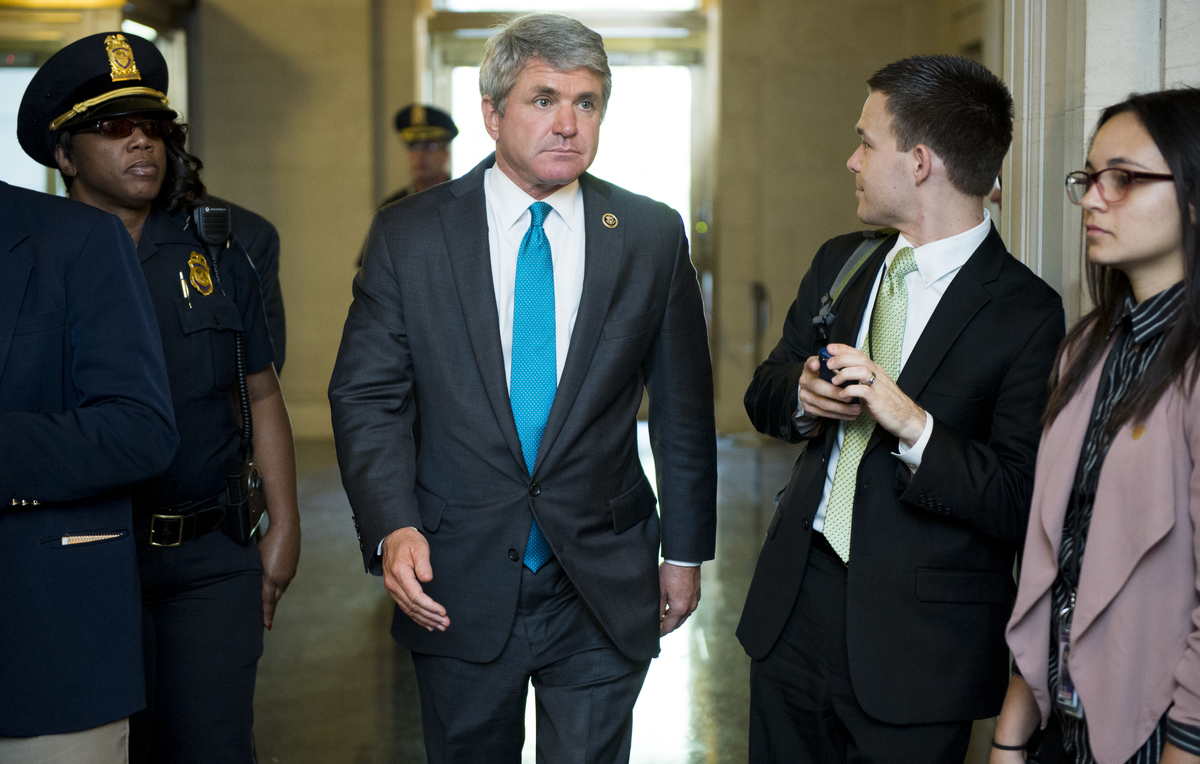Two Veteran Chairmen in Forefront After Paris Attacks

After the Sept. 11 attacks, the most famous moment when terrorism instantly replaced the economy as the congressional agenda item, editors here struggled to assemble a list of 28 lawmakers prepared to take ownership of the Hill’s new mission.
Nineteen of them have left in the intervening 14 years, making way for a new generation of members driving debates about foreign intelligence, international relations, military defense and domestic protection policies. And because of the Republican takeover of the Senate in 2014 and House GOP term limits, six of the eight committees that will take the lead in shaping the congressional response to the Islamic State got new chairmen this year.
The situation stands to focus extra attention in the weeks ahead on the pair in the House who have held their gavels two years longer than the rest: Michael McCaul of Texas at Homeland Security and Ed Royce of California at Foreign Relations.
Their political temperaments are very different, allowing the crisply acerbic Texan to become much more prominent in the public eye than the understated and even-keeled southern Californian.
But both are unambiguously hawkish and have expressed similar sentiments since last week’s attacks in Paris, urging President Barack Obama to intensify the fight against ISIS through bombings and giving arms to those willing to combat the jihadists on their home turf. At the same time, each chairmen opposes putting American boots on the ground.
“We’ve never suggested deploying U.S. ground troops,” Royce said Monday on CNN, responding to Obama’s declaration that he won’t do what many Republicans in Congress want by deploying a contingent of U.S. forces. “That’s a red herring argument.”
On NBC’s “Meet the Press” Sunday, McCaul said, “We’re not going to put a hundred U.S. combat troops on the ground, nor should we. But this has to be a policy of defeat and destruction and not this containment issue that’s been going on for two years.”
McCaul’s committee issued a bipartisan report in September concluding that security gaps in other nations, particularly in Europe, make it too easy for jihadists to move between their home bases and the West. To help prevent that problem from endangering Americans, he is among the most prominent lawmakers on the roster opposing any Syrian refugees settling here.
“We don’t want to be complicit with a program that could bring in potential terrorists into the United States,” he said. “I’ve been briefed by the FBI and Homeland Security, and they tell me that this cannot be properly done. We don’t have the databases to vet them.”
The appearances were the latest evidence of McCaul’s seeming ubiquity on television — and Royce’s relatively rare visibility.
McCaul is much more sought after by booking producers because of his ability to synthesize national security threats and to pungently criticize almost all of Obama’s responses.
“The rise of radicalism we are witnessing today is not just a passing phenomenon,” has been a favorite sound bite of late, with versions uttered in several hearings and on several cable news networks this year. “The war against Islamist terror will be the great struggle of our lifetime, the great struggle of this century.”

Royce’s most notable proposal for combating ISIS is legislation beefing up international broadcasting to counter the militants’ propaganda. At the same time, he cultivates the sort of passionless wonkiness and commitment to bipartisanship that doesn’t translate readily in much of the universe of four-minute cable news appearances, and when he gets acerbic it’s generally behind closed doors. (His judiciousness, however, did help to prompt a brief spurt of interest in his becoming House speaker had Paul D. Ryan tuned down the job this fall.)
McCaul visited Paris in May after the terrorist attack on the satirical magazine Charlie Hebdo and consulted with French anti-terror experts about the dangers of jihadists traveling to Europe from Iraq and Syria.
And he’s been opposing the resettlement in the U.S. of refugees from Syria and Turkey at least since February. At a committee hearing, he quoted himself as warning Obama’s national security adviser, Susan Rice, that such a move would amount to “a federally sanctioned welcome party, if you will, to potential terrorists in the United States.”
McCaul, 53, won an open seat between Austin and Houston a decade ago and was assigned right away to the Homeland Security panel — a natural fit for someone who’d spent much of his career as a federal prosecutor focused on counter-terrorism and national security cases. (He also worked in the Justice Department’s public integrity section, and as a result was tapped for a six-year stint on the House Ethics Committee.)
When the Homeland chairmanship came open at the end of 2012, it took several rounds of voting by the Republican Steering Committee for McCaul to prevail over Candice S. Miller of Michigan and Mike D. Rogers of Alabama.
Royce, 64, has been in Congress more than twice as long, having been first elected to represent parts of Orange and Los Angeles counties in 1992 after a decade as a state senator. A former tax manager, he also sits on Financial Services. Like McCaul, Royce has been on the committee he now chairs since his freshman term and won the gavel by besting a longer-serving colleague, in his case Christopher H. Smith of New Jersey.
The two are opposites in at least one way. McCaul is the second wealthiest member of Congress thanks to the fortune his father-in-law made in the radio business. Royce is among the 100-plus members who reported a negative minimum net worth as of the end of last year.
See photos, follies, HOH Hits and Misses and more at Roll Call’s new video site.
Get breaking news alerts and more from Roll Call in your inbox or on your iPhone.





